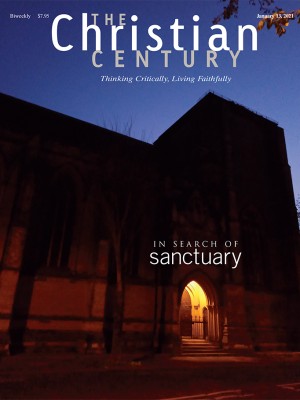Tending love in a time of trauma
My mother grew up in a violent home. But violence was not the totality of her life.

Between saying good-bye to 2020 and wondering what a new year and a new presidency will bring, I am filled with ambivalence. The prospect of normalcy feels impossible, and not just in terms of gathering, eating out, and traveling. Something has been unveiled or unleashed in our midst, and we can’t—we shouldn’t—unsee it.
Maybe instead of normalcy the best we can hope for is something like remission. By the 2020 election, the cancer had already spread. We live in that perilous waiting, trying to hold onto some semblance of what life was before the diagnosis, the chemo, the constant sitting by the phone for test results. In the meantime, people still get married, get promotions, and welcome new life. Remission means we can breathe for a few moments, can gather ourselves without the specter of illness lingering.
Read our latest issue or browse back issues.
This sense of reaching out for normalcy in the midst of deathly prognosis has been my 2020. As we turn to 2021 I’ve been thinking about my mother, who died of lung cancer when I was 25. She grew up in a violent home with an alcoholic, abusive father. Everything in her life could have added up to her continuing the legacy of violent dysfunction. But she didn’t.
My mother struggled with depression, back injuries, and chronic arthritis. But the moment my father took off his belt in drunken frustration when I was up past my bedtime, she told him to leave. Her children were not going to know the violence and fear that she had known.
The story would be Disney-worthy if it ended there. But trauma sometimes feels like it has its own natural law—too often it is not destroyed but redirected. In our home economic insecurity was a constant. My mother carried the trauma of her life in her body, and sometimes her depression and anxiety would seep into slammed cabinets or deep sighs that began a spiral that ended with days in bed or even a trip to a hospital.
I didn’t know violence in childhood, but I knew worry. I learned to notice the slightest change in the house’s atmosphere. When the winds shifted I would clean my room or do a chore or draw a picture or offer a hug, wanting to slow the momentum and bring her some semblance of peace. While pain was always with her, I also felt my mother’s utter determination to give us a different life than she had.
In the midst of all of this, my mother found so much joy in the world—in my brother and me, in her siblings, in food, in meeting a new person at the grocery store, even in my father, who stayed in our lives (in fits and starts) until they finally remarried after he was diagnosed with colon cancer. My mother and her life were all of this, the pain and the joy.
I suppose she comes to mind right now in part because of the ineffable uncertainty that is our present. But thinking about her life also makes me wonder about the rhetoric of inauguration, of “saving” democracy, of all the grand stories we use to make sense of our past and future. Mythological figures like a sacrificial mother or a nation-saving election offer easy stories to tell—and ways to garner support or demonize others. It is another matter to face the complexity of our actual lives and histories. It is too nice a story to simply say my mother did not reproduce the violence of her home but never speak of just how much energy is required to resist the inertia of our collective trauma and still recognize life in our midst.
Perhaps this is the real meaning of cross and resurrection, baptism, the Lord’s Supper. These central Christian signs never move us beyond violence and trauma, but they show us that these are not the totality of our lives. Kallistos Ware speaks of God’s creative work as an “ongoing reality.” There is not an ideal point in the past, nor is heaven a geographic space in the future. In God’s incarnation creation, redemption has been pressed into the world, into every moment of our lives. In doing so God tells us not to look beyond this world toward some ideal myth for the presence of the holy or the possibility of freedom.
“The good life does not ignore suffering,” writes Ada María Isasi-Díaz. “It struggles to go beyond it, to evade it. As a matter of fact, what our fiestas suggest is that parties and celebrations are needed in order for Latinas to deal in a creative way with the suffering that surrounds us instead of allowing it to define us.” Isasi-Díaz’s call to struggle is the substance of love, maybe even the imago Dei.
A fiesta might seem like an odd act of resistance and liberation, but I saw this so often in my mother’s life. A party, food prepared with care, finding laughter and joy in the ones you love—there is life in this struggle. It is not ideal, and the fiesta doesn’t mitigate the pain or the anger. But as I remember my mother’s life, I am reminded that you don’t have to idealize an end in order to walk toward it.
This new year may not see pervasive systemic change or radical cultural shifts, but if my mother’s life is any indication, the ability to tend love in the wake of trauma is no less brave or miraculous. And if we see the beauty in the ambiguity—the full spectrum of human experience, its fulsomeness and its strains—we might see glimpses of the kingdom of God in our midst, even while we hope to feel its fullness someday.
A version of this article appears in the print edition under the title “Tending love amid trauma.”






